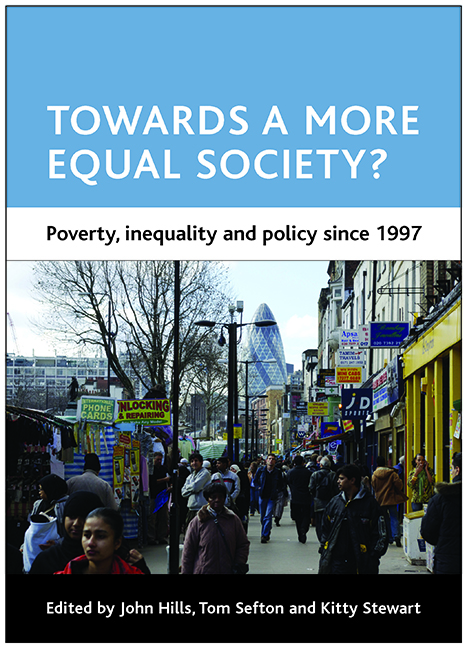five - More equal working lives? An assessment of New Labour policies
Published online by Cambridge University Press: 22 January 2022
Summary
Introduction
This chapter examines how New Labour policies have had an impact on inequality in people's lives derived from their experience in the labour market. For most individuals, their income and social status is derived directly through their employment; when children, through their parents’ employment; for some adults, through their partner's employment; for retired people, through their own and/or their partner's work histories. While New Labour did not set out to reduce inequality in the labour market as a main policy objective, it has tackled inequality in employment rates as a result of a number of major policy objectives and through setting a range of targets. The three main targets are:
• to achieve ‘full employment’ through the Employment Opportunity for All agenda (defined as an 80% employment rate);
• to eradicate child poverty by 2020 (with a strong focus on facilitating families to work their way out of poverty; see Chapter Three); and
• to reach a 70% employment rate among lone parents by 2010.
While policies designed to meet these targets have had an impact on the unequal distribution of work across individuals and households, they have not addressed labour market inequality in terms of earnings inequality. The National Minimum Wage introduced in April 1999 has benefited many low-paid workers but has had little impact on inequality. There have also been some changes to Income Tax and National Insurance schedules (see Chapter Two) but not enough to have a noticeable impact on inequality. As discussed in Chapter Four, New Labour has tried to tackle education inequalities (which are the largest determinants of earnings inequality) but it is unlikely that these policies will be enough to have a large impact on inequality in the labour market and it will be some time before the impact will be noticed (although change for younger cohorts should be detectable 10 years on). Much of the ‘making work pay’ agenda addresses inequality in individual/family income, rather than pay, such as tax credits, in-work credits and back-to-work bonuses.
Background and inheritance
When New Labour came to power in 1997 it inherited a labour market that had experienced a great deal of turbulence since 1979. Two large recessions had seen claimant unemployment reach highs of around 10% in the early 1980s and early 1990s.
- Type
- Chapter
- Information
- Towards a More Equal Society?Poverty, Inequality and Policy since 1997, pp. 91 - 114Publisher: Bristol University PressPrint publication year: 2009

